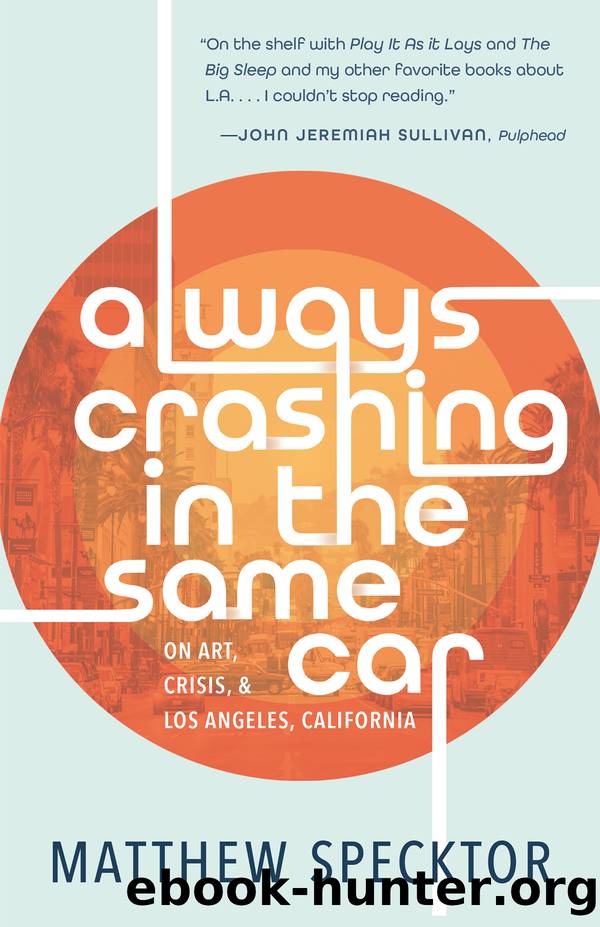Always Crashing in the Same Car: On Art, Crisis, and Los Angeles, California by Matthew Specktor

Author:Matthew Specktor [Specktor, Matthew]
Language: eng
Format: epub
Tags: Biography & Autobiography, Entertainment & Performing Arts, Literary Figures, Personal Memoirs
ISBN: 9781951142636
Google: J5YiEAAAQBAJ
Publisher: Tin House Books
Published: 2021-07-27T23:20:31.887953+00:00
Why Tuesday Weld? I spent a lot of time wondering, in those weeks after D and I started talking again, why he chose to come in waving his arms over this particular enthusiasm. Not that it mattered, such was our friendship, and such was D, so who cared what lit him up enough to call me out of the blue? I was happy just to have him back. He never said much about the places heâd been, the travails heâd suffered in the yearsâmore than a decadeâsince Iâd seen him last, and I didnât press. But he seemed different, when we spoke on the phone: calmer, less manic. He spoke of his sobriety without proselytizing, and even as I gathered the last couple of years had been particularly brutal, I got the sense that he had come through. Our daughters were roughly the same age, and we talked a lot about our kids, about their steadying influence, and about how our marriages had come apart. (D blamed no one but himself.) Chastened by failure, saddened by his divorce, trundling along in the shadow of a successful father, utterly delighted by his daughter, and at odds with his day job, he reminded me of someone else, namely myself, and so whenever we talked, I would feel refreshed. I felt understood, and in some sense seen, if not exactly vindicated. D had arrived at a certain sanity, I thought, of the sort only a real maniac can possess, because there is a clarity of thoughtâor rather, a clarity of understandingâthat comes from burning yourself down to the wick. I loved D more than I ever had even when we were younger, because heâd turned his former chaos into wisdom, balanced the scales, it seemed to me, on the whole game of success and failure.
Was this why Weld? Because (with the benefit of hindsight, at least) she seems to have balanced them too. On the Cavett Show, freshly sober (though she is careful not to define herself as alcoholic; âI could have been,â she says when asked if she has ever identified as such, âbut I stoppedâ), she seems cool as a matador when invited to perform the crooked dance of publicity. She is at once guarded and open, defended without ever quite being defensive. If the game of fame involves being both naked and invulnerableâthe âgameâ at least as defined by those who get to set the rules, the spectatorsâthen Weld is playing it perfectly. If it involves, rather, feeling like a human being instead of a fatted calf, well, then, who knows, but itâs worth noting that Weld retains her poise, and more importantly her sharpness, all the way through the interview. When the next guest, Milton Berle, shows up and bloviates confidently, boringly, with all the entitlement of a male celebrity whoâs used to being listened to, Weld interrupts him with an observation that seems telling. They are talking about Orson Welles, the question of whether the great director really enjoyed acting (having just done so alongside Weld in A Safe Place) or if he was merely slumming.
Download
This site does not store any files on its server. We only index and link to content provided by other sites. Please contact the content providers to delete copyright contents if any and email us, we'll remove relevant links or contents immediately.
Machine Learning at Scale with H2O by Gregory Keys | David Whiting(4295)
Never by Ken Follett(3937)
Harry Potter and the Goblet Of Fire by J.K. Rowling(3848)
Unfinished: A Memoir by Priyanka Chopra Jonas(3381)
Fairy Tale by Stephen King(3370)
The Man Who Died Twice by Richard Osman(3072)
Will by Will Smith(2911)
Rationality by Steven Pinker(2352)
It Starts With Us (It Ends with Us #2) by Colleen Hoover(2344)
Can't Hurt Me: Master Your Mind and Defy the Odds - Clean Edition by David Goggins(2324)
The Dark Hours by Michael Connelly(2300)
The Storyteller by Dave Grohl(2229)
Friends, Lovers, and the Big Terrible Thing by Matthew Perry(2219)
The Dawn of Everything: A New History of Humanity by David Graeber & David Wengrow(2197)
The Becoming by Nora Roberts(2189)
The Stranger in the Lifeboat by Mitch Albom(2113)
Cloud Cuckoo Land by Anthony Doerr(2102)
Love on the Brain by Ali Hazelwood(2062)
Einstein: His Life and Universe by Walter Isaacson(2011)
